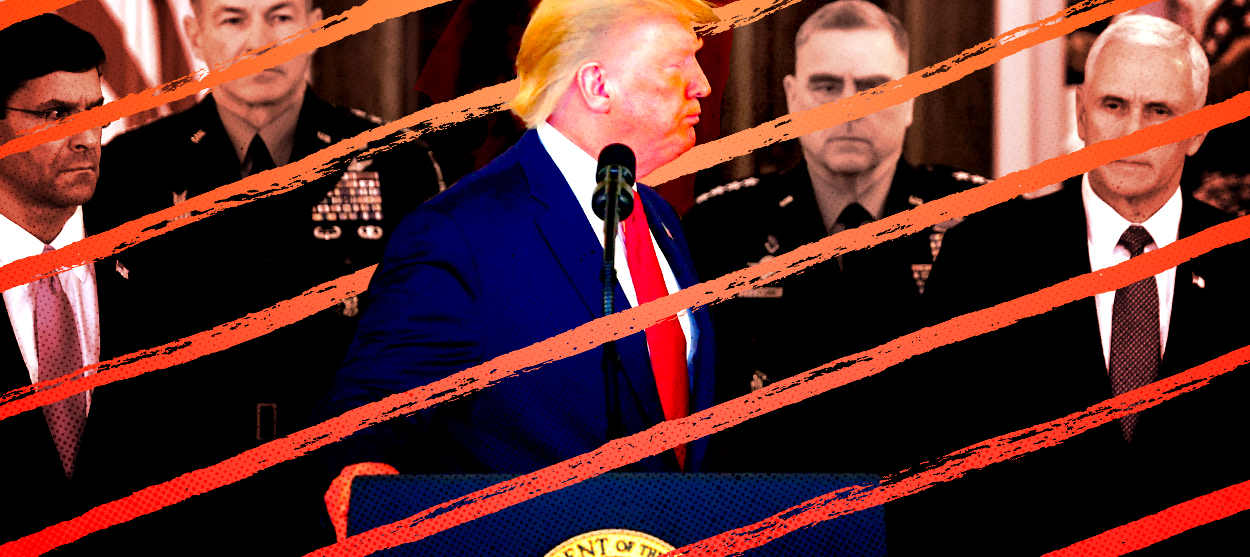Trump's Iranian diplomacy gambit
That was heartening


A free daily email with the biggest news stories of the day – and the best features from TheWeek.com
You are now subscribed
Your newsletter sign-up was successful
Like millions of other Americans I had absolutely no idea what would come of President Trump's address on Wednesday in response to Iran's attack on Tuesday night on a military base in Iraq. The fact that he was not scheduled to speak from the Oval Office made it unlikely that he would be announcing an escalation in the conflict between Washington and Tehran, much less the commencement of an invasion.
But I do not think anyone was prepared for what ensued. After an awkward-sounding introduction about Iran's nuclear potential, he thanked American military personnel for their sacrifices and defended the recent killing of Qassem Soleimani, the commander of the Iranian paramilitary group Quds Force. Then he did something that made his opening statement seem more sensible in retrospect: He outlined a plan not only for an end to the current hostilities but a new era of peace and cooperation between the United States and Iran.
This was premised upon two things: Iran's abandonment of its nuclear ambitions in accordance with a revised version of the Obama-era Joint Comprehensive Plan of Action and the acknowledgement of a common enemy in ISIS and other Wahhabist groups. It is difficult to overstate the significance of the latter. For much of the last two decades, the defining feature of American foreign policy in the Middle East has been a blinkered refusal to acknowledge the internal tensions between countries within the broader Iranian Shiite axis and radical Sunni militants (see: Pence, Michael). Even when this reality has been noted, it has almost never been assumed that shared enemies could be the basis for cooperation of any kind between the United States and Iran. I for one cannot pretend this was not heartening.
The Week
Escape your echo chamber. Get the facts behind the news, plus analysis from multiple perspectives.

Sign up for The Week's Free Newsletters
From our morning news briefing to a weekly Good News Newsletter, get the best of The Week delivered directly to your inbox.
From our morning news briefing to a weekly Good News Newsletter, get the best of The Week delivered directly to your inbox.
That said, it must be observed that we know absolutely nothing about the actual framework according to which these two policies — nuclear non-proliferation and the defeat of Wahhabism — will be pursued. Nor is it entirely clear whether the killing of Soleimani was always meant to be the precursor to the vague gestures in the direction of peace Trump made on Wednesday. Was the assassination of Iran's top military commander part of a grand design meant to force their hand, or is the decidedly non-truculent rhetoric coming out of the White House a spectacular piece of improvisation from the least predictable president in modern American history? We cannot know.
But one thing is undeniable. If Trump, with help from our European allies, is able to draft a better version of the 2015 nuclear agreement, one that is easier to enforce and includes non-negotiable or reversible features such as the ability of American inspectors to visit Iranian military facilities, it would be a good thing for the United States, Iran, and the world.
What would such a deal look like? How it would be negotiated? When, and by whom? If it were successful, would it be possible to follow it up with security cooperation between our two countries without arousing the (understandable) ire of our allies in the region? Can any meaningful progress be made on either of these goals within the next year, or even the next five? Is Trump's Cabinet staffed with people who see value in such objectives, to say nothing of having the diplomatic acumen and fortitude to pursue them? There is ample reason to be skeptical about all of these things. But a quiet and inchoate hope is better than the alternative of war.
In this sense, we are all in the same position we were before Trump walked up to the podium on Wednesday morning — waiting, hoping, begging, praying for something that promises an end to the reality of endless war in the Middle East that two generations of Americans have lived with for virtually their entire lives.
A free daily email with the biggest news stories of the day – and the best features from TheWeek.com
Matthew Walther is a national correspondent at The Week. His work has also appeared in First Things, The Spectator of London, The Catholic Herald, National Review, and other publications. He is currently writing a biography of the Rev. Montague Summers. He is also a Robert Novak Journalism Fellow.
